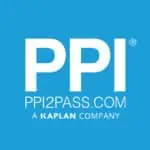In this article, (and video above), I explain all the steps you need to take right after you pass your NCEES Fundamentals of Engineering exam to make the most of your achievement.
Here Is What You Will Need to do After Passing the FE Exam:
- You will need to send your transcript to the state board where you want certification, and then wait to receive your EIT certificate in the mail. Here are some things we recommend you do once you receive your EIT certificate.
- Place these credentials after your name wherever you can. For example, add EIT after your name on your LinkedIn profile. This is important because it shows potential employers that you are on track to receive your engineering license.
- While it may be too early to start studying for the Principles and Practice of Engineering (PE) exam, it’s not too early to create an experience log and keep it up to date between now and when you take the PE exam, logging all of your experience. This is critically important, because when you go to apply for the PE exam, they will ask for a list of all of your experience which will include the projects and tasks that you worked on and which professional engineers you worked under. These professional engineers will need to sign the application for you. Too many engineers wait to try to prepare this list when they are applying for the exam and they forget all of the details of what projects they worked on.
- Last but now least, you must gain engineering work experience as soon as possible. Get out there in the field and start working as soon as you can to build up your experience which will help you to be able to sit for the PE exam sooner in most states.
How Soon Can You Take the PE Exam After Passing the FE Exam?
The simple answer is that it varies by state. For the most part, EITs can take the PE exam once they’ve successfully passed the FE and have acquired four years of approved engineering experience. It’s worth noting that some states allow EITs to take the PE exam before accruing their four years of experience. Experience is still required, but it’s not a prerequisite for the exam in these states that have decoupled the exam from the experience requirement..
Building an Entry-Level Engineering Resume
As I mentioned, even though you’ve passed that FE exam, which is a wonderful accomplishment, the PE exam requires that you have knowledge gained in engineering practice—four years of engineering practice to be exact (in most states).
Gaining the required engineering experience means you’ll need to put together a resume to get a job. You’re just starting out, so if you don’t have a great deal of relevant work experience when applying for jobs, be sure to emphasize the skills that you’ve used in other non-technical positions, such as management skills or public speaking experience, maybe from a school club or project. Also, be sure to include courses related to your field or intended career.
Here Are Some Recommended Items to Incorporate Into Your Entry-Level Engineer Resume:
- Contact information: Your full name, phone number, email address, and links to your professional website or networking sites.
- Objective statement: Share your skills, and goals to give employers more information on your background and qualifications.
- Skills: Highlight your skills relevant to engineering – problem-solving, equipment/software knowledge, math skills, etc.
- Education: List your engineering education, including the coursework, extracurricular activities, and the name of each school.
- Experience: Remember to add volunteer work, internships, and work experience, including the duties and responsibilities of those positions.
- Certifications: List your engineering certifications as well as the name of the certifying institution.
Preparing For, and Passing, the PE Exam
Once you’ve gained all of the necessary experience, you’ll want to start preparing for the PE exam. Be sure to contact your state engineering licensure board, because most states require that applications be submitted well in advance.
Remember, the format and subject matter of each discipline’s test varies. For example, the PE Environmental exam is an 8-hour, open-book exam that consists of 50 multiple-choice questions in the morning session and 50 multiple-choice questions in the afternoon. It covers engineering areas such as water, solid waste, air, and environmental health and safety.
On the other hand, the Civil Principles and Practice of Engineering (PE) exam is an exam of breadth consisting of 40 multiple-choice questions. It is also open-book, but contains questions from civil engineering areas such as transportation, geotechnical, construction, and structural.
Lastly, all of these exams are moving to Computer Based Testing, and most will be CBT by the end of 2022. Just like for the FE exam, PPI offers a series of test prep materials for the PE exam. Be sure to browse PPI’s offerings and select the exam in the area that pertains to you.
Sources
What Happens After You Pass the NCEES FE Exam?
This Episode Is Brought to You by PPI

I hope you found this week’s FE mathematics exam prep question helpful. In upcoming articles, I will answer more FE Exam questions and run through more practice problems. We publish videos bi-weekly on our Pass the FE Exam YouTube Channel. Be sure to visit our page here and click the subscribe button as you’ll get expert tips and tricks – to ensure your best success – that you can’t get anywhere else. Believe me, you won’t want to miss a single video.
Lastly, I encourage you to ask questions in the comments of the videos or here on this page and I’ll read and respond to them in future videos. So, if there’s a specific topic you want me to cover or answer, we have you covered.
I’ll see you next week.
Anthony Fasano, P.E.
Engineering Management Institute
Author of Engineer Your Own Success

Leave a Reply